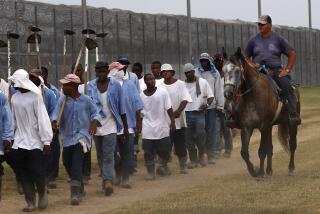8 Die, Thousands Held Hostage in Brazil Prison Riots
- Share via
RIO DE JANEIRO — A coordinated wave of riots blamed on a powerful inmate gang swept through 21 prisons in the tense penal system of Brazil’s Sao Paulo state Sunday, leaving at least eight people dead and thousands of hostages in the hands of rioters.
The epicenter of the violence was the correctional complex at Carandiru, Latin America’s biggest penitentiary, which holds 8,000 inmates. Mobs of prisoners armed with knives, clubs and firearms launched an uprising during visiting hours, taking scores of hostages, including many women and children, and barricaded themselves in cellblocks.
Police commandos stormed into the prison yards, surrounded the cellblocks and threw tear gas grenades as they advanced. Smoke wafted out of barred windows, gunshots were exchanged, and inmates were seen dragging two wounded men who left trails of blood. Sunday’s eight confirmed fatalities included some at Carandiru and two inmates at another prison, according to state justice officials. At least 18 people were wounded at Carandiru.
Tensions abated somewhat as negotiators moved in to talk to inmate leaders at the prison late Sunday night. Brazilian television reported that as many as 15,000 prisoners had taken thousands of hostages at the height of the uprisings, but many captives were released as police retook as many as 10 prisons by Sunday evening. Carandiru alone receives 12,000 visitors on an average Sunday, and there were media estimates that between 3,000 and 7,000 hostages--including hundreds of children and 27 guards--remained in the facility.
Hard numbers were scarce, however. State public security officials refused to estimate the number of hostages, saying the situation was too chaotic.
Riots, escapes and bloodshed are daily occurrences in Brazil’s desperate penal facilities. But the scope and synchronization of Sunday’s mutinies in multiple prisons were unprecedented, according to veteran human rights activist Maria Luisa Mendonca of the Global Justice Network in Sao Paulo.
“It is something we have never seen, so many rebellions at the same time,” Mendonca said in a telephone interview. “It is just amazing.”
State justice officials blamed the uprisings on a prison gang called the First Command of the Capital, known by the Portuguese initials PCC. It was described as a prison-based offshoot of Brazil’s increasingly powerful drug-trafficking gangs and organized-crime rings.
Last week, authorities transferred 10 leaders of the gang out of Carandiru and confiscated cell phones, guns and grenades from their quarters. In response, there were protests by inmates and relatives, causing elite riot police to spend the week on alert outside the vast and aging complex. Nonetheless, tensions exploded Sunday.
“We detected last week several leaders of the organized-crime organization and transferred them,” said Marco Vinicio Petreluzzi, the state’s secretary of public security. “What is happening today is in retaliation for that.”
Sunday night, four prison administrators were trying to negotiate with leaders of the rebellious Carandiru inmates. The 8-year-old PCC allegedly is the most powerful such group in state prisons and controls trafficking of drugs and guns among inmates. It claims the allegiance of about 10%, or 10,000, of the inmates in the state’s 60 prisons, according to officials and human rights experts.
The barricaded inmates reportedly demanded the return to Carandiru of five transferred leaders and the withdrawal from the prison of police tactical units.
Meanwhile, at the Belem prison in Sao Paulo, officials said two inmates were slain by fellow prisoners before police regained control of the facility. Television reports showed naked inmates being herded out of cellblocks by police raiders and lined up against walls. The air was filled with clouds of tear gas and smoke from fires set during the riot.
The mayhem reflected the dire conditions in Brazil’s jampacked jails and prisons. Human rights groups and Brazilian justice officials have graphically documented the squalor, overcrowding and inmate violence in the facilities, as well as corruption, torture and bureaucratic torpor on the part of authorities. The number of inmate riots usually escalates during holiday seasons as frustrations build; Brazil’s carnival starts this month.
The riots threatened to unleash the worst nightmare of Sao Paulo authorities, who have won recognition for efforts to reform prisons and jails in Brazil’s most populous state since the massacre of 111 inmates at Carandiru during an uprising in 1992.
In particular, reformers have tried to reduce the dangers of Carandiru. Authorities have shifted inmates to medium-sized, theoretically more controllable penitentiaries and segregated the most dangerous criminals, such as gang leaders.
“There is nothing else we can do but isolate those individuals, and that is what this secretariat has been doing,” said Nagashi Furukawa, the state’s administrator of prisons.
But despite some progress, human rights activists say a culture of violence and corruption plagues both the state’s adult prisons and its juvenile facilities. Although criminal gangs such as the PCC are dangerous, they have also led collective efforts to win better treatment for all inmates, Mendonca said.
In addition, Brazil’s notoriously slow court system worsens the tensions in prisons, as does the brutality by police and other authorities, activists say. Mendonca noted that the former police commander accused of leading the massacre at Carandiru nine years ago has not yet completed his criminal trial.
“The years go by, and not much has changed,” Mendonca said. “People are losing hope.”
Criminal lawyer Antonio Pitombo took a sterner view.
“The truth is that prisons in Sao Paulo and other states have for some time been controlled by criminal organizations,” Pitombo said. “It is very grave that they continue to control crime in the penitentiaries.”
Special correspondent Gobbi reported from Rio de Janeiro and Times staff writer Rotella from Buenos Aires.
More to Read
Sign up for Essential California
The most important California stories and recommendations in your inbox every morning.
You may occasionally receive promotional content from the Los Angeles Times.













